| ID |
Date |
Author |
Topic |
Subject |
|
289
|
07 Aug 2006 |
Stefan Ritt | Info | New multi-threaded midas slow control system | Multi-threaded slow control system
The Midas slow control system has been modified to support multi-threaded slow control front-ends. Each device gets it's own thread in the front-end, which has several advantages:
- the communication of all devices runs in parallel and therefor is much faster
- slow devices cannot block any more the front-end. Response times to run transitions etc. become therefore much faster.
This modification requires some minor modifications in the existing class and device drivers.
Dropping of CMD_xxx_ALL commands
The slow control commands CMD_SET_ALL, CMD_GET_ALL, CMD_SET_CURRENT_LIMIT_ALL, CMD_GET_CURRENT_LIMIT_ALL, etc. have been dropped. They were there to accomodate some slow devices, which sometimes works a bit faster if all channels are set or read at once. Since the inter-thread communication scheme implemented now does only allow passing one channel at a time, the "ALL" functions cannot be supported any more. On the other hand this is not such an issue any more, since slow devices are handled now in parallel, speeding up things considereably.
The command have been removed from midas.h and from all device and class drivers coming with the midas distribution. If you have your own drivers, just delete the sections wich use these commands.
Calling the device driver inside the class driver
The device drivers have now to be called differently in the class driver. The reason for that is that in a multi-threaded front-end, there is only one central device driver dispatcher, which communicates with the individual device driver threads. The device drivers do not need to be modified, but all existing class drivers need modification, if they are going to be run in a multi-threaded front-end. Old class drivers which are not used in a multi-threaded front-end do not to be modified.
Following modifications are necessary:
- Remove following line:
#define DRIVER(_i) ...
- Find all lines containing
DRIVER(i)(CMD_xxx, info->dd_info[i], ...)
and replace them with
device_driver(info->driver[i], CMD_xxx, ...)
note that info->dd_info[i] is not passed any more. Instead, you pass info->driver[i]. Pleae note that the arguments passed after CMD_xxx are not checked by the compiler, since they are a variable argument list. Any error there will not produce a compiler warning, but will just crash the front-end.
- Find the line with
status = pequipment->driver[i].dd(CMD_INIT, hKey, &pequipment->driver[i].dd_info,
pequipment->driver[i].channels,
pequipment->driver[i].flags,
pequipment->driver[i].bd);
and replace it with
status = device_driver(&pequipment->driver[i], CMD_INIT, hKey);
- Find the line with
pequipment->driver[i].dd(CMD_EXIT, pequipment->driver[i].dd_info);
and replace it with
device_driver(&pequipment->driver[i], CMD_EXIT);
- Find following lines
hv_info->driver[i] = pequipment->driver[index].dd;
hv_info->dd_info[i] = pequipment->driver[index].dd_info;
hv_info->channel_offset[i] = offset;
hv_info->flags[i] = pequipment->driver[index].flags;
and replace them with
hv_info->driver[i] = &pequipment->driver[index];
hv_info->channel_offset[i] = offset;
The class drivers multi.c and generic.c can be used as a reference for these modifications.
Implementing CMD_STOP command
For multithread-enabled device drivers it is necessary to support the CMD_STOP command, which is needed to stop all device threads before the actual device gets closed. Following code is necessary:
INT cd_xxx(INT cmd, EQUIPMENT * pequipment)
{
INT i, status;
switch (cmd) {
case CMD_INIT:
...
case CMD_STOP:
for (i = 0; pequipment->driver[i].dd != NULL &&
pequipment->driver[i].flags & DF_MULTITHREAD ; i++)
status = device_driver(&pequipment->driver[i], CMD_STOP);
break;
case CMD_IDLE:
...
return status;
}
Enabling multi-thread support
To turn on multi-thread support for a device, the flag DF_MULTITHREAD must be used in the front-end user code device driver list, such as
DEVICE_DRIVER multi_driver[] = {
{"Input", nulldev, 2, null, DF_INPUT | DF_MULTITHREAD},
{"Output", nulldev, 2, null, DF_OUTPUT | DF_MULTITHREAD},
{""}
}; |
|
2355
|
16 Mar 2022 |
Stefan Ritt | Info | New midas sequencer version | A new version of the midas sequencer has been developed and now available in the
develop/seq_eval branch. Many thanks to Lewis Van Winkle and his TinyExpr library
(https://codeplea.com/tinyexpr), which has now been integrated into the sequencer
and allow arbitrary Math expressions. Here is a complete list of new features:
* Math is now possible in all expressions, such as "x = $i*3 + sin($y*pi)^2", or
in "ODBSET /Path/value[$i*2+1], 10"
* "SET <var>,<value>" can be written as "<var>=<value>", but the old syntax is
still possible.
* There are new functions ODBCREATE and ODBDLETE to create and delete ODB keys,
including arrays
* Variable arrays are now possible, like "a[5] = 0" and "MESSAGE $a[5]"
If the branch works for us in the next days and I don't get complaints from
others, I will merge the branch into develop next week.
Stefan |
|
2358
|
22 Mar 2022 |
Stefan Ritt | Info | New midas sequencer version | After several days of testing in various experiments, the new sequencer has
been merged into the develop branch. One more feature was added. The path to
the ODB can now contain variables which are substituted with their values.
Instead writing
ODBSET /Equipment/XYZ/Setting/1/Switch, 1
ODBSET /Equipment/XYZ/Setting/2/Switch, 1
ODBSET /Equipment/XYZ/Setting/3/Switch, 1
one can now write
LOOP i, 3
ODBSET /Equipment/XYZ/Setting/$i/Switch, 1
ENDLOOP
Of course it is not possible for me to test any possible script. So if you
have issues with the new sequencer, please don't hesitate to report them
back to me.
Best,
Stefan |
|
2385
|
15 Apr 2022 |
Stefan Ritt | Info | New midas sequencer version | I prepared some slides about the new features of the sequencer and post it here so
people can have a quick look at get some inspiration.
Stefan |
| Attachment 1: sequencer.pdf
|
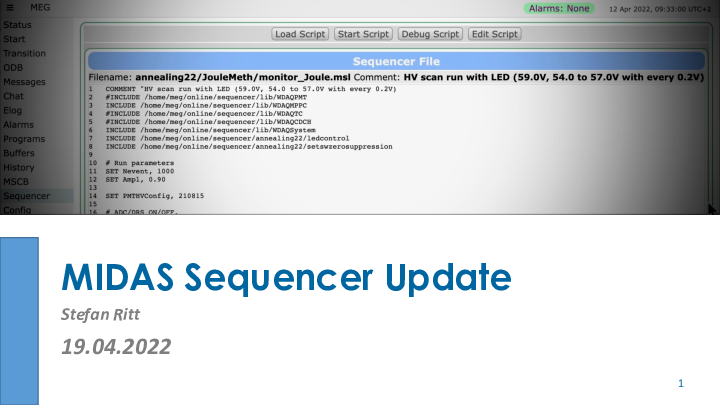
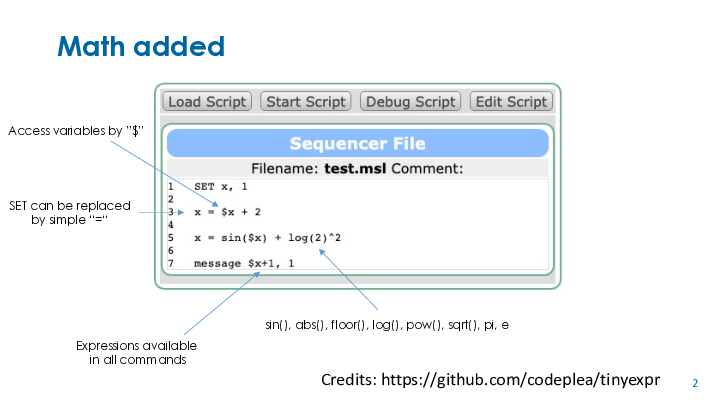
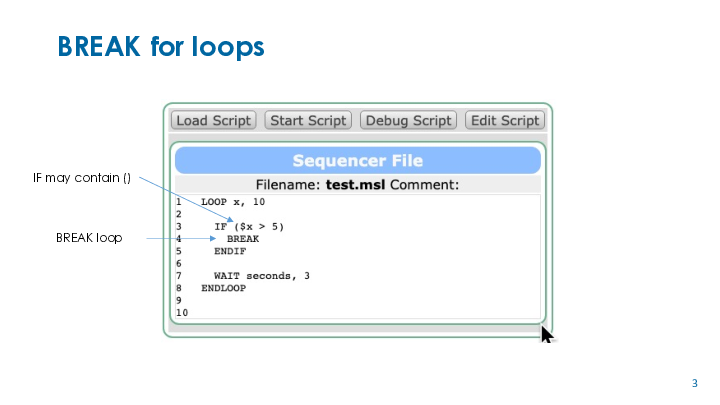
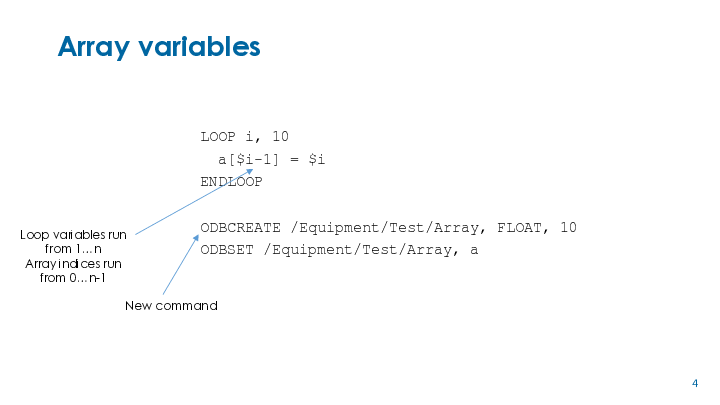
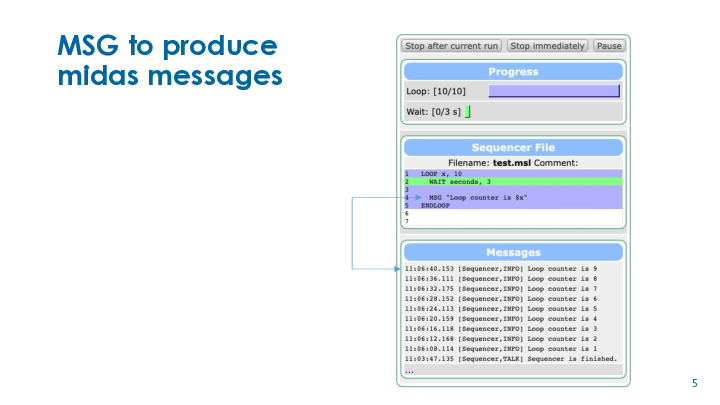
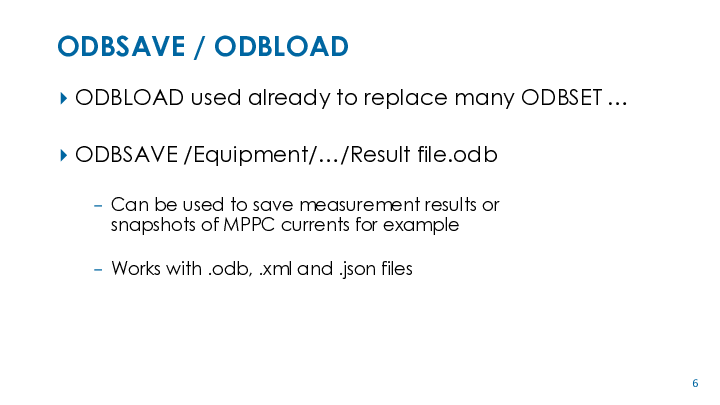
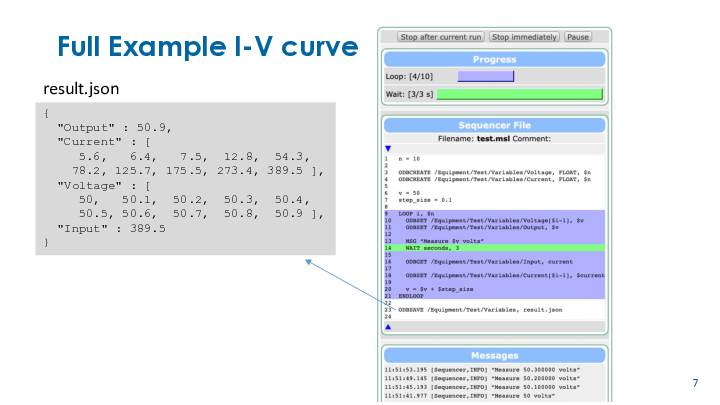
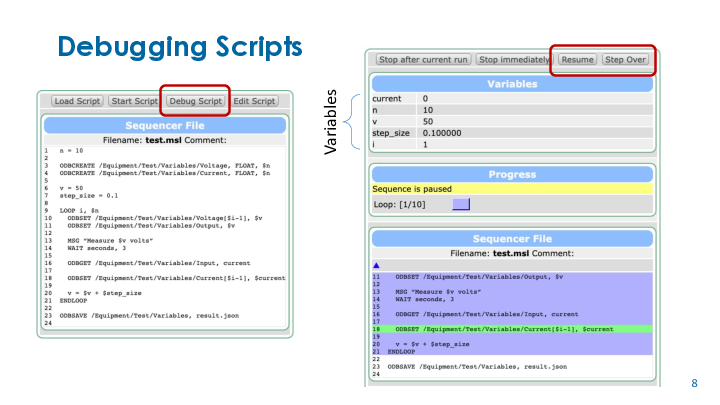
|
|
1958
|
24 Jun 2020 |
Stefan Ritt | Info | New image history system available | I'm happy to report that the Corona Lockdown in Europe also had some positive side
effects: Finally I found time to implement an image history system in midas,
something I wanted to do since many years, but never found time for that.
The idea is that you can incorporate any network-connected WebCam into the midas
history system. You specify an update interval (like one minute) and the logger
fetches regularly images from that webcam. The images are stored as raw files in
the midas history directory, and can be retrieved via the web browser similarly to
the "normal" history. Attached is an image from the MEG Experiment at PSI to give
you some idea.
The cool thing now is that you can go "backwards" in time and browse all stored
images. The buttons at each image allow you to step backward, forward, and play a
movie of images, forward or backward. You can query for a certain date/time and
download a specific image to your local disk. You can even synchronize all time
axes, drag left and right on each image to see your experiment from different
cameras at the same time stamps. You see a blue ribbon below each image which shows
time stamps for which an image is available.
Initially, only the most recent image is loaded to speed up loading time. As soon
as you click on the image or one of the arrow buttons, previous images are loaded
progressively, which you can see in the ribbon bar becoming blue. For slow internet
connections this can take some time. For typical webcams and one minute update
period you get typically a few GB per week.
To make this happen, you define a new ODB subtree
/History/Images/<name>/
Name: Name of Camera
Enabled: Boolean to enable readout of camera
URL URL to fetch an image from the camera
Period Time period in seconds to fetch a new image
Storage hours Number of hours to store the images (0 for infinite)
Extension Image file extension, usually ".jpg" or ".png"
Timescale Initial horizontal time scale (like 8h)
The tricky part is to obtain the URL from your camera. For some cameras you can get
that from the manual, others you have to "hack": Display an image in your browser
using the camera's internal web interface, inspect the source code of your web page
and you get the URL. For AXIS cameras I use, the URL is typically
http://<name>/axis-cgi/jpg/image.cgi
For the Netatmo cameras I have at home (which I used during development in my home
office), the procedure is more complicated, but you can google it. The logger is
now linked against the CURL library to fetch images, so it also support https://.
If libcurl is not installed on your system, the image history functionality will be
disabled.
I tested the system for a few days now and it seem stable, which however does not
mean that it is bug-free. So please report back any issue. The change is committed
to the current develop branch.
I hope this extension helps all those people who are forced to do more remote
monitoring of experiment during these times.
Best,
Stefan |
| Attachment 1: Screenshot_2020-06-24_at_17.21.11_.png
|
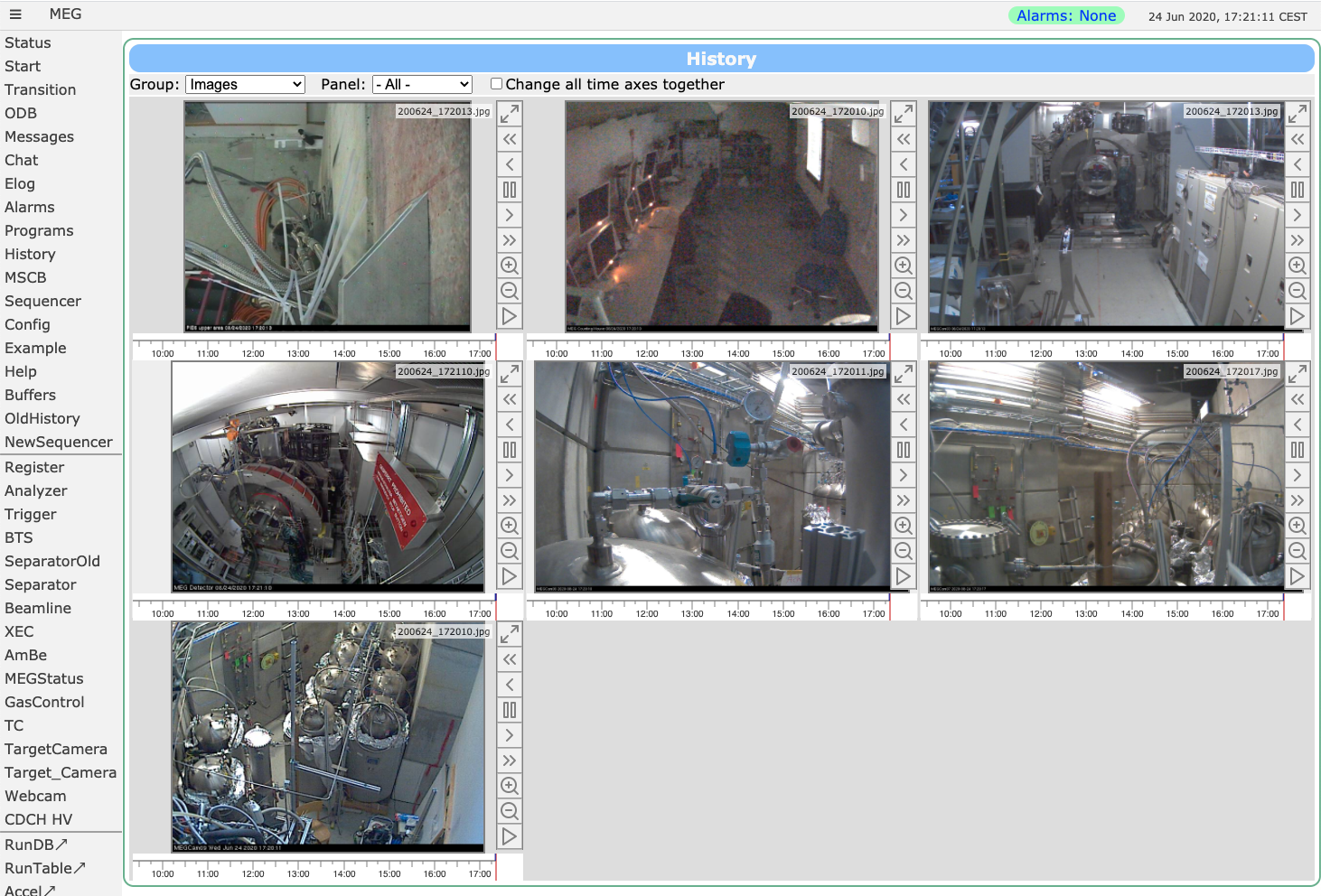
|
|
2794
|
31 Jul 2024 |
Lukas Gerritzen | Bug Report | New history plots: Zooming in on logarithmic y axis does not work as expected | Using the mouse to click and drag on a logarithmic y axis triggers a zooming behaviour as if the user zoomed in on a linear axis.
How to reproduce:
Take a plot that ranges from 1e-20 to 100, for example. Click around the middle of the axis and drag the mouse up to about 3/4.
Expected result:
Limit the y axis to the approximate range 1e-10 to 1e-4
Actual result:
The y axis limits are around 50 and 75.
P.S. Is there a way to configure the history plot in a way that values of 0.00 are ignored rather than showing up as 1e-20? |
|
2795
|
31 Jul 2024 |
Stefan Ritt | Bug Report | New history plots: Zooming in on logarithmic y axis does not work as expected | I fixed that and committed the change to megon02, just reload your browser. I also set ymin and ymax of the Vacuum plot to meaningful
values (not to zero!).
Stefan |
|
1662
|
14 Aug 2019 |
Stefan Ritt | Info | New history plot facility | During my visit at TRIUMF we rewrote the history plotting functionality of midas. Instead of
static GIF images, we have now interactive JavaScript panels where we can scroll, zoom,
inspect values and much more (example is attached). We are now in a state where this is still
work in progress, but already at this stage it might be useful for others to report any
feedback.
Simply upgrade the the newest develop branch of midas, and you will see two menu items
"OldHistory" which is the old system and "History" which is the new system. In the new
system, you can drag with the mouse to scroll, use the mouse wheel to zoom in and out the
time axis, and hover with your mouse over data points to see its value. If you zoom out,
old data is loaded automatically in the background.
Following items are planned, but not yet implemented:
- Printing of run markers as in the old history
- Delete old data in the buffer to limit memory consumption if the browser window is
open for very long (weeks)
- Implement time interval selector (clock icon, select "last day", "last 8 hours" etc.)
- New settings dialog as a floating dialog box. At the moment, the setting page of the
old history system is used
- Export / Printing / Sending to ELOG any history plot
- Implement a formula for plotting data, such as "y = 12 * (x-14) +32". This will replace
the old "offset" and "factor" and is more flexible. The formula can be passed directly
to the JavaScript engine and will be executed on the web page. It should be also
possible to combine different channels, like the difference of two history values.
- Determine the number of digits for variable display from the axis limits. Like if a value
changes between 520001 and 520002 only, we need more digits than the usual 6.
Many of these things will be implemented in the next weeks. If you have any more idea
or find some bugs, please report back to me.
Best,
Stefan for the midas team |
| Attachment 1: Screenshot_2019-08-14_at_8.50.53_.png
|
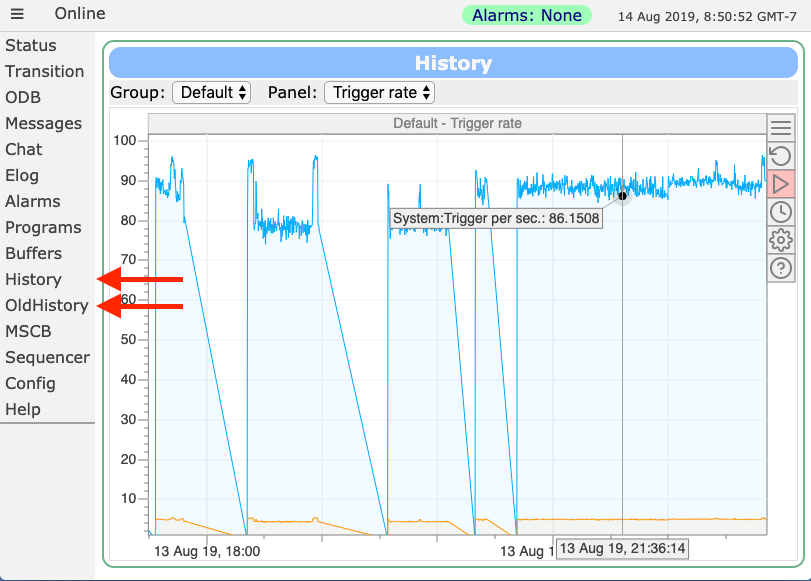
|
|
1673
|
06 Sep 2019 |
Andreas Suter | Info | New history plot facility | I like the new history system very much, but I stumbled over a couple of issues.
I used the version "Thu Aug 29 08:24:29 2019 +0200 -
midas-2019-06-b-244-gdd6585bb on branch develop":
1) it would be nice to have an option to format the label output (see attachment 1)
2) the background of a history plot is very handy if you only show one measure.
If you have multiple ones (see attachment 2), this is not the case anymore. It
would be nice if the background could be enabled/disabled.
> During my visit at TRIUMF we rewrote the history plotting functionality of
midas. Instead of
> static GIF images, we have now interactive JavaScript panels where we can
scroll, zoom,
> inspect values and much more (example is attached). We are now in a state
where this is still
> work in progress, but already at this stage it might be useful for others to
report any
> feedback.
>
> Simply upgrade the the newest develop branch of midas, and you will see two
menu items
> "OldHistory" which is the old system and "History" which is the new system. In
the new
> system, you can drag with the mouse to scroll, use the mouse wheel to zoom in
and out the
> time axis, and hover with your mouse over data points to see its value. If you
zoom out,
> old data is loaded automatically in the background.
>
> Following items are planned, but not yet implemented:
>
> - Printing of run markers as in the old history
>
> - Delete old data in the buffer to limit memory consumption if the browser
window is
> open for very long (weeks)
>
> - Implement time interval selector (clock icon, select "last day", "last 8
hours" etc.)
>
> - New settings dialog as a floating dialog box. At the moment, the setting
page of the
> old history system is used
>
> - Export / Printing / Sending to ELOG any history plot
>
> - Implement a formula for plotting data, such as "y = 12 * (x-14) +32". This
will replace
> the old "offset" and "factor" and is more flexible. The formula can be
passed directly
> to the JavaScript engine and will be executed on the web page. It should be
also
> possible to combine different channels, like the difference of two history
values.
>
> - Determine the number of digits for variable display from the axis limits.
Like if a value
> changes between 520001 and 520002 only, we need more digits than the usual 6.
>
> Many of these things will be implemented in the next weeks. If you have any
more idea
> or find some bugs, please report back to me.
>
> Best,
> Stefan for the midas team |
| Attachment 1: label_issue.png
|
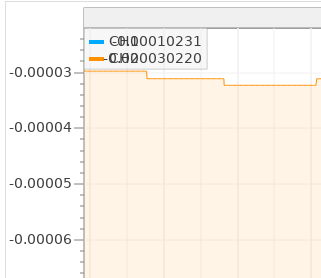
|
| Attachment 2: many_labels.png
|
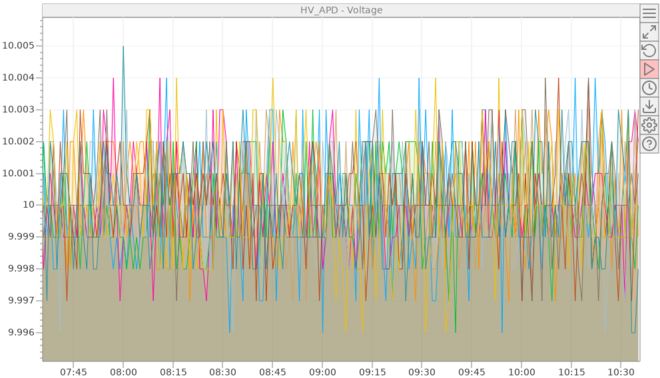
|
|
1674
|
06 Sep 2019 |
Stefan Ritt | Info | New history plot facility | > 1) it would be nice to have an option to format the label output (see attachment 1)
That's clearly a bug, I will fix it.
> 2) the background of a history plot is very handy if you only show one measure.
> If you have multiple ones (see attachment 2), this is not the case anymore. It
> would be nice if the background could be enabled/disabled.
Looking at your plot, even without the background things look messy. Please note
that you can display only a single curve by double clicking on it (and back with Escape).
If all curves are on top of each other, you can get them apart a bit by zooming
in to the vertical axis, then double click. Let ma know if that works for you.
Best regards,
Stefan |
|
1675
|
06 Sep 2019 |
Andreas Suter | Info | New history plot facility | > > 2) the background of a history plot is very handy if you only show one measure.
> > If you have multiple ones (see attachment 2), this is not the case anymore. It
> > would be nice if the background could be enabled/disabled.
>
> Looking at your plot, even without the background things look messy. Please note
> that you can display only a single curve by double clicking on it (and back with Escape).
> If all curves are on top of each other, you can get them apart a bit by zooming
> in to the vertical axis, then double click. Let ma know if that works for you.
This I found out, yet the attachment here shows another case where it would be useful to be
able to disable the background, namely if you have positive and negative measures in one
plot. Somehow it suggests that CH1 and CH2 show very different values, whereas it is only a
difference in the sign of this variables.
It's not all the important but I would like to mention this is the early stage before
everything is fully frozen. |
| Attachment 1: plot_plus_minus.png
|

|
|
Draft
|
07 Sep 2019 |
Stefan Ritt | Info | New history plot facility | > This I found out, yet the attachment here shows another case where it would be useful to be
> able to disable the background, namely if you have positive and negative measures in one
> plot. Somehow it suggests that CH1 and CH2 show very different values, whereas it is only a
> difference in the sign of this variables.
Ok, I added
- a correction which does the fill not to the bottom of the window, but only to the y=0 axis.
- a flag "Show graph fille" which lets you turn on and off the filling for each plot
Best,
Stefan |
|
1678
|
07 Sep 2019 |
Stefan Ritt | Info | New history plot facility | > This I found out, yet the attachment here shows another case where it would be useful to be
> able to disable the background, namely if you have positive and negative measures in one
> plot. Somehow it suggests that CH1 and CH2 show very different values, whereas it is only a
> difference in the sign of this variables.
Ok, I added an option which lets you switch off the background.
I also changed the background drawing such that it only goes to the y=0 axis, not the bottom of the screen.
That should help displaying negative values.
Stefan |
| Attachment 1: Screenshot_2019-09-07_at_13.52.49_.png
|
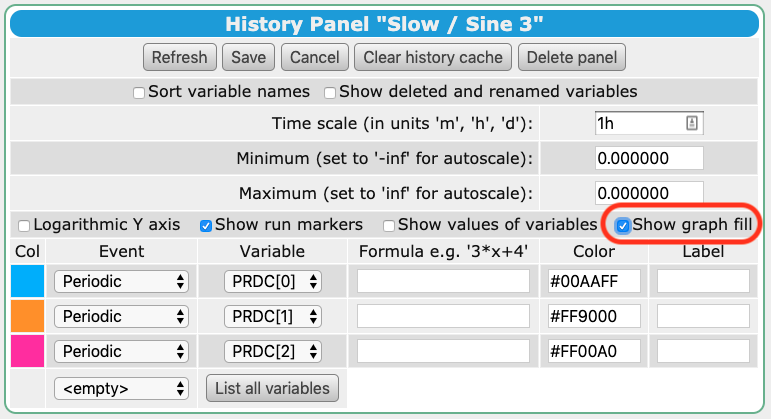
|
| Attachment 2: Slow-Sine_3-20198107-132905-20198107-135305.png
|
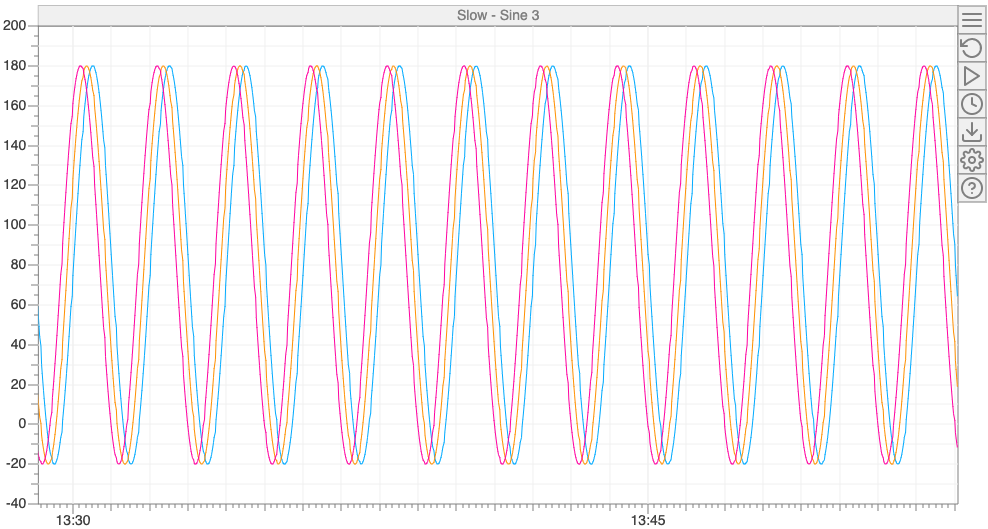
|
|
1679
|
08 Sep 2019 |
Stefan Ritt | Info | New history plot facility | > 1) it would be nice to have an option to format the label output (see attachment 1)
I fixed that in the current version.
Stefan |
| Attachment 1: Screenshot_2019-09-08_at_12.29.12_.png
|
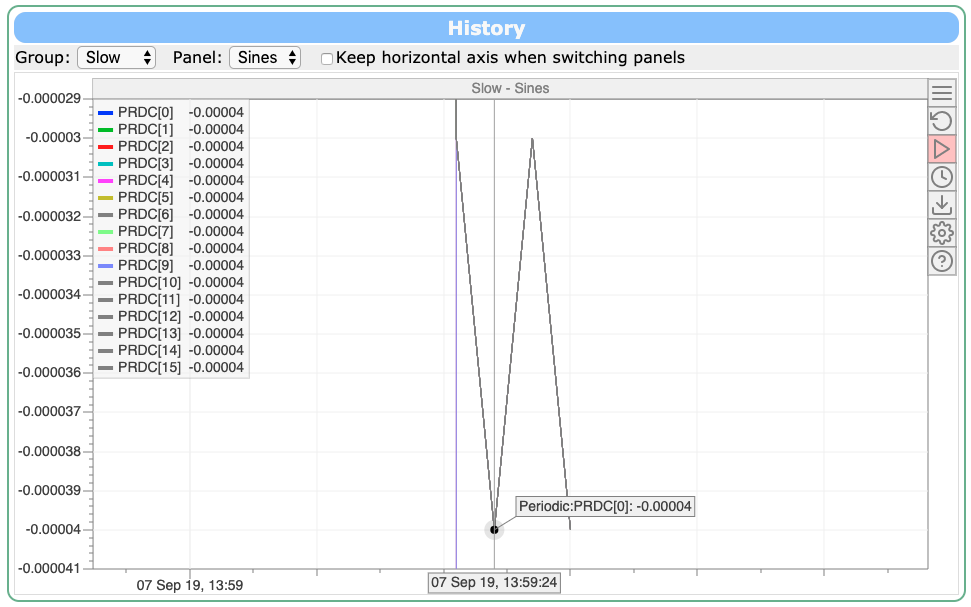
|
|
1681
|
10 Sep 2019 |
Andreas Suter | Info | New history plot facility | Our typical use case is that a lot of people are connected to the experiment
having some history tabs open most of the time. Hence, I setup a test system and
connect to it from all kind of systems/browsers. What I see currently quite
often is the error hs_read_arraybuffer (see the attachement).
For firefox 60.8.0esr this can result into a full freeze of the tab and only
closing it is possible.
For chromium based browsers you eventually get a popup informing that it is not
responsive anymore.
The worst though is safari 12.1.2 which not only freezes the tab, but
reproducibly crashes the mhttpd on the server side.
Are there ways to get a log which would document where the problems start? |
| Attachment 1: history_hangs.PNG
|
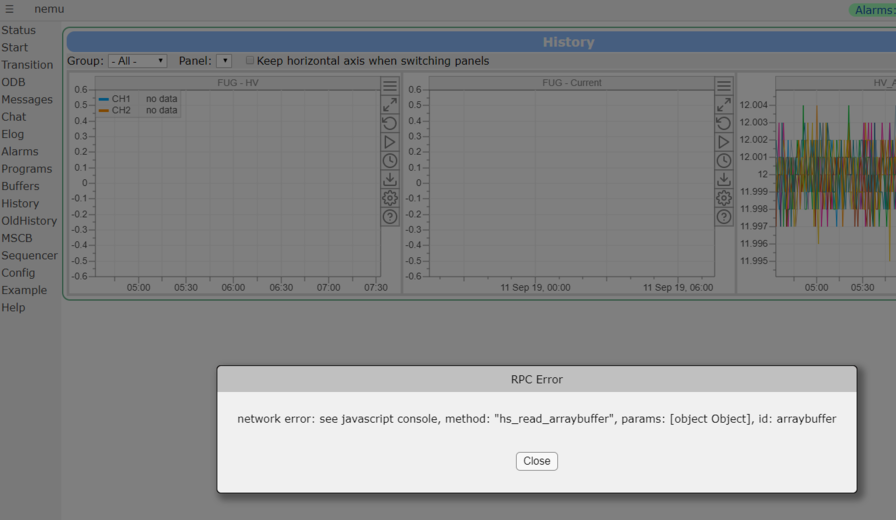
|
|
1687
|
16 Sep 2019 |
Konstantin Olchanski | Info | New history plot facility | > I see currently quite often is the error hs_read_arraybuffer (see the
attachement).
> Are there ways to get a log which would document where the problems
start?
> [also crash of mhttpd]
We can debug it from both ends, javascript and mhttpd:
On the web page, the error message says "see javascript console", do you see
anything there?
Or the tab is so hung-up that you cannot even access the console? In this
case, can you open the console before running your test?
In some browsers (firefox, google-chrome) this will also activate the javascript
debugger and as likely as not will make the bug go away (ouch!)
On the mhttpd side, please capture the stack trace from the crash: enable
core dumps (ODB "/experiment/enable core dumps" set to "y", after the crash,
run "ls -l core.*; gdb mhttpd core.9999") or run mhttpd inside gdb or attach
gdb to a running mhttpd (gdb -p 9999). Once in gdb, run "info thr" to list all
threads, "thr 0; bt", "thr 1; bt", etc to get stack traces from all threads, only
one of them contains the crash (tedious!).
Email me the stack trace (or post here), in case we want to look at values
of any variables from the crash, keep the core dump and do not rebuild
mhttpd.
K.O. |
|
1688
|
16 Sep 2019 |
Konstantin Olchanski | Info | New history plot facility | > During my visit at TRIUMF we rewrote the history plotting functionality of midas.
This is a most amazing achievement. We wanted to do this "for years" and I think we have
benefitted greatly from the delay - tools available for building interactive web graphics
have improved so much so recently.
For example, delivering binary data from mhttpd to javascript (avoiding json encoding and decoding
saves tons of CPU cycles) went from "how do I do this?!?" to "I did it in only 3 hours!".
> We are now in a state where this is still work in progress, but already at this stage it might
> be useful for others to report any feedback.
The old gif-based history plots took a lot of effort and a long time to get where they work well
for most experiments and where we are happy with them.
From the TRIUMF side of things, lots of polishing of the graphics and of the user interface came
through use at our bigger experiments - TWIST (TRIUMF), ALPHA (CERN), T2K/ND280 (Japan).
So, much improvement and polishing of the new graphics is still ahead for us.
> Simply upgrade the the newest develop branch of midas, and you will see two menu items
> "OldHistory" which is the old system and "History" which is the new system.
I hope to start the new release branch for midas-2019-09 soon. For the release, we will try
to have both the old and the new history graphics to integrate smoothly. The old graphics
still has to work well, as some users may prefer the old graphics and the old user interface.
Also the new system is still incomplete, i.e. there is no trivial way to save a history plot into a file:
> Following items are planned, but not yet implemented:
> - Printing of run markers as in the old history
> - Export / Printing / Sending to ELOG any history plot
K.O. |
|
1690
|
16 Sep 2019 |
Stefan Ritt | Info | New history plot facility | > Also the new system is still incomplete, i.e. there is no trivial way to save a history plot into a file:
That has been implemented in meantime. Just click on the download arrow and you can save the current window in CSV or PNG format.
Stefan |
|
1694
|
17 Sep 2019 |
Andreas Suter | Info | New history plot facility | > On the mhttpd side, please capture the stack trace from the crash: enable
> core dumps (ODB "/experiment/enable core dumps" set to "y", after the crash,
> run "ls -l core.*; gdb mhttpd core.9999") or run mhttpd inside gdb or attach
> gdb to a running mhttpd (gdb -p 9999). Once in gdb, run "info thr" to list all
> threads, "thr 0; bt", "thr 1; bt", etc to get stack traces from all threads, only
> one of them contains the crash (tedious!).
>
> Email me the stack trace (or post here), in case we want to look at values
> of any variables from the crash, keep the core dump and do not rebuild
> mhttpd.
>
> K.O.
here comes the stack trace (only happens when using safari 12.1.2 macOS 10.14.6):
(gdb) thr 1
[Switching to thread 1 (Thread 0x7f57ceffd700 (LWP 3538))]
#0 0x00007f57f29fe377 in raise () from /lib64/libc.so.6
(gdb) bt
#0 0x00007f57f29fe377 in raise () from /lib64/libc.so.6
#1 0x00007f57f29ffa68 in abort () from /lib64/libc.so.6
#2 0x00007f57f330e7d5 in __gnu_cxx::__verbose_terminate_handler() () from
/lib64/libstdc++.so.6
#3 0x00007f57f330c746 in ?? () from /lib64/libstdc++.so.6
#4 0x00007f57f330c773 in std::terminate() () from /lib64/libstdc++.so.6
#5 0x00007f57f330c993 in __cxa_throw () from /lib64/libstdc++.so.6
#6 0x00007f57f330cf2d in operator new(unsigned long) () from /lib64/libstdc++.so.6
#7 0x00007f57f336ba19 in std::string::_Rep::_S_create(unsigned long, unsigned long,
std::allocator<char> const&)
() from /lib64/libstdc++.so.6
#8 0x00007f57f336c62b in std::string::_Rep::_M_clone(std::allocator<char> const&,
unsigned long) ()
from /lib64/libstdc++.so.6
#9 0x00007f57f336ccfc in std::basic_string<char, std::char_traits<char>,
std::allocator<char> >::basic_string(std::string const&) () from /lib64/libstdc++.so.6
#10 0x000000000041ce0f in check_digest_auth (hm=hm@entry=0x7f57ceffc520, auth=0x74b060
<auth_mg>)
at /home/nemu/nemu/tmidas/midas/progs/mhttpd.cxx:17143
#11 0x0000000000452a61 in handle_http_message (msg=0x7f57ceffc520, nc=0x2019ca0,
this=<optimized out>,
this=<optimized out>, this=<optimized out>) at
/home/nemu/nemu/tmidas/midas/progs/mhttpd.cxx:17703
#12 handle_http_event_mg (nc=nc@entry=0x2019ca0, ev=ev@entry=100,
ev_data=ev_data@entry=0x7f57ceffc520)
at /home/nemu/nemu/tmidas/midas/progs/mhttpd.cxx:17753
#13 0x0000000000464c4b in mg_call (nc=nc@entry=0x2019ca0,
ev_handler=0x4521f0 <handle_http_event_mg(mg_connection*, int, void*)>, ev=100,
ev_data=ev_data@entry=0x7f57ceffc520) at
/home/nemu/nemu/tmidas/midas/progs/mongoose6.cxx:2120
#14 0x000000000046790e in mg_http_call_endpoint_handler (nc=nc@entry=0x2019ca0,
ev=<optimized out>,
hm=hm@entry=0x7f57ceffc520) at /home/nemu/nemu/tmidas/midas/progs/mongoose6.cxx:4946
#15 0x0000000000467e3f in mg_http_handler (nc=nc@entry=0x2019ca0, ev=ev@entry=3,
ev_data=ev_data@entry=0x7f57ceffcb2c) at
/home/nemu/nemu/tmidas/midas/progs/mongoose6.cxx:5139
#16 0x0000000000464c4b in mg_call (nc=nc@entry=0x2019ca0,
ev_handler=0x467a20 <mg_http_handler(mg_connection*, int, void*)>,
ev_handler@entry=0x0, ev=ev@entry=3,
ev_data=ev_data@entry=0x7f57ceffcb2c) at
/home/nemu/nemu/tmidas/midas/progs/mongoose6.cxx:2120
#17 0x0000000000464fb7 in mg_recv_common (nc=nc@entry=0x2019ca0,
buf=buf@entry=0x7f57c0000cd0, len=len@entry=279)
at /home/nemu/nemu/tmidas/midas/progs/mongoose6.cxx:2676
#18 0x00000000004659c8 in mg_if_recv_tcp_cb (len=279, buf=0x7f57c0000cd0, nc=0x2019ca0)
at /home/nemu/nemu/tmidas/midas/progs/mongoose6.cxx:2680
#19 mg_read_from_socket (conn=0x2019ca0) at
/home/nemu/nemu/tmidas/midas/progs/mongoose6.cxx:3378
#20 mg_mgr_handle_conn (nc=0x2019ca0, fd_flags=1, now=now@entry=1568705761.3290441)
at /home/nemu/nemu/tmidas/midas/progs/mongoose6.cxx:3511
#21 0x0000000000465ee0 in mg_mgr_poll (mgr=mgr@entry=0x7f57ceffcda0,
timeout_ms=timeout_ms@entry=1000)
at /home/nemu/nemu/tmidas/midas/progs/mongoose6.cxx:3687
#22 0x0000000000466085 in per_connection_thread_function (param=0x2019ca0)
at /home/nemu/nemu/tmidas/midas/progs/mongoose6.cxx:3805
#23 0x00007f57f39c7ea5 in start_thread () from /lib64/libpthread.so.0
#24 0x00007f57f2ac68cd in clone () from /lib64/libc.so.6 |
|
1695
|
17 Sep 2019 |
Konstantin Olchanski | Info | New history plot facility | > > On the mhttpd side, please capture the stack trace from the crash
>
> here comes the stack trace (only happens when using safari 12.1.2 macOS 10.14.6):
>
> #10 0x000000000041ce0f in check_digest_auth ...
>
The crash is in check_digest_auth() which checks the mongoose web server password (if not using
password protection from the https proxy i.e. apache httpd).
If so you should see this crash on all pages, not just when you access history pages, yes?
Ok, I just checked, my safari is "Version 12.1.2 (13607.3.10)" and I see no immediate crash, even on
history pages.
But I am macos 10.13.6, maybe that makes a difference.
If you see the safari crash on all pages, then it is not history-specific.
In this case, I would like you to file a bug report on bitbucket "mhttpd crash with safari" and we follow up
on it there.
K.O. |
|